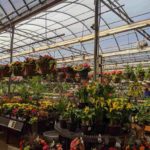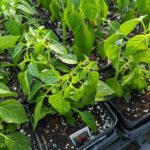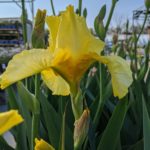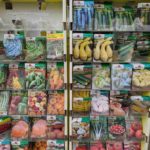Why Do Vegans Need a Garden?
Posted in: eating vegan, Gardening, Health, Plant-Based, Vegan Living
Tags: Gardening, Plant-Based, Vegan
There’s a lot to say about gardening. Any gardening—whether you select ornamentals, herbs, or fruits and veggies. The simple act of putting seeds or bulbs in the dirt connects you directly to the planet. Think of it… you are not just scurrying about, rushed and unaware. You are slowed down enough to literally reach into the Earth and plant a life that will nourish you, as you, in turn, nourish it. Everyone needs this connection.
More specifically, as vegans, we live on plant foods. Being personally familiar with the process of growing and caring for plant life makes you much more aware of food in a way that simply warming up a Beyond Burger never will. There is a process to growing food. It cannot be rushed, it cannot be computerized, it cannot be processed. If you have already committed to yourself, the animals, the planet by embracing veganism, I hope you step further once more, and grow food, herbs or ornamentals. Every vegan or vegetarian should share in the work, at least once, of growing a plant they will eat. Only this experience will give you a personal relationship with plants, the very things you are building your body from with each bite, 365 days a year.
It doesn’t matter if you live in the city, country or suburbs. If you rent one room or you own a sprawling estate. You should personally consider growing something this year. At least one little potted plant. As a vegan, vegetarian, veg-curious person or just as an earthling, this kind of action will touch you in a way nothing else can, feeding your heart, body and soul like only the Earth is able.
And this isn’t just my opinion. Loads of people with PhDs think so too. Check it out. According to Psychology Today, NIH, and Harvard Medical School, there are physical and mental benefits to growing a garden:
Ecotherapy
Research in a growing scientific field called ecotherapy has shown a strong connection between time spent outdoors and reduced stress, anxiety, and depression. (2) “In a 2015 study, researchers compared the brain activity of healthy people after they walked for 90 minutes in a natural setting. … They had lower activity in the prefrontal cortex, a brain region that is active during rumination — defined as repetitive thoughts that focus on negative emotions”. (2) Further, interacting with nature offers more therapeutic benefits. For instance, lower blood pressure and levels of the stress hormone cortisol, which calms the body’s fight-or-flight response.(2) In a Japanese study, viewing plants altered EEG recordings and reduced stress, fear, anger and sadness, as well as reducing blood pressure, pulse rate and muscle tension. Another Japanese study simply found that it is more beneficial psychologically to view a green hedge rather than concrete. (3) Basically, getting outside and being with plants, trees, and greenery can make literal, measurable improvements in your emotional and mental wellbeing.
Acceptance & Peacefulness
As vegan, we can be a very tenacious bunch and want to passionately share our perspective. Sometimes, though, we need to accept people where they are before they can accept us, or even consider our ideas. As an activist of more than two decades, I understand this well. This is a lesson gardens can teach: acceptance. No one has complete control and in your garden, you must “accept the limits of… control and the unpredictability of life.” (1) This is a practice, and according to experts, increases peace of mind and gentleness toward your life view. You cannot make your roses bloom faster; you cannot stop cabbage loopers from visiting your kale. You must learn to accept nature as she is and do the best you can for your plants.
When you tend a garden, you are “having a relationship with the plot of ground you’re tending.” (1) You must learn to patiently nurture seedlings and then plants, as they mature, flower and bear seeds or fruit/veggies. You must closely observe them, and often, you will find you have connections to them individually. Simply being outdoors, you will become intimate with the cycle of the seasons, noticing the weather, the insects and wild animals, and the entire ecosystem in all new ways that you may have overlooked before. Gardens require care, compassion, and understanding. They will foster the same emotions in you.
Good Exercise
Gardening combines physical activity with exposure to nature and sunlight. “Sunlight lowers blood pressure as well as increasing vitamin D levels in the summer, and the fruit and vegetables that are produced have a positive impact on diet and nutrition.” (3) Working in the garden creates dexterity and strength as it engages your mind and body at the same time. The aerobic exercise involved can easily burn the same number of calories as might be expended in a gym. So, yes, you might get sore from a day of gardening. Digging, raking, and mowing are definitely calorie-burners. In fact, if you are not accustomed to this kind of work, start slow. Don’t dive into a huge garden plot. Build yourself — and your garden — up gradually. Every garden zone can yield throughout the year, there’s no need to rush to put it all in the ground right away. “The (Department of Health) calculates that an increase of only 10% in average exercise by adults would postpone 6000 deaths and save $500 million annually”. (3) Regular moderate exercise may reduce the risk of dementia, mental health problems, cardiovascular disease, diabetes, and cancer of the breast and colon, and in an Australian study, gardening was found to be more effective than walking or eliminating moderate alcohol intake in protecting against dementia. (3) Seems like there are some great reasons to grow your own bell peppers, right? Did you know that bell peppers are also delicious? Which leads to my next point…
Eating Your Work
Last but not least, a garden of your own is really the freshest food available. It doesn’t get more whole food, plant-based than a tomato, pepper, lettuce, or carrots from your own yard, or even a snip of basil, parsley, or thyme from your own windowsill tossed into pasta. It’s the very definition of minimally processed.
Growing a plant friend is something you can do today, maybe even right now. And AASPCA is here to help. I’ll be posting blogs throughout the year discussing veganic gardening techniques (no, don’t buy blood, bone or manure for your garden – you DON’T need it!), how to attract pollinators, ideas for foraging wild plants, recipes from my garden, and more.
About the Author:
Rissa Miller is a vegan of 26 years, but has been gardening her entire life. There are photos of her as a toddler eating dirt under a raspberry bush. Clearly, she was always meant to be vegan. When not tending plants, Rissa is the Senior Editor of the Vegetarian Journal magazine, co-operates Baltimore Vegan Drinks, and is studying part time to be a clinical herbalist via The Herbal Academy and Chestnut School of Herbal Medicine. She is also a published author and poetess, regionally-produced playwright, and loves long walks in the woods with her dog, The Dude.
Footnotes:
1 https://www.psychologytoday.com/us/blog/think-act-be/201906/10-mental-health-benefits-gardening
2 https://www.health.harvard.edu/mind-and-mood/sour-mood-getting-you-down-get-back-to-nature
3 https://www.ncbi.nlm.nih.gov/pmc/articles/PMC6334070/








Leave a Reply